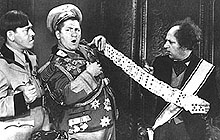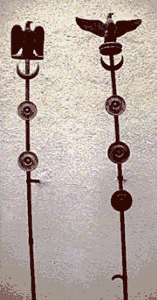![]()
Well, I've decided to start something new. From now until I get tired of it, I'll be pointing you, the unsuspecting Internet traveller, to a different history topic or site every week or month or something, whenever I get around to it.
Just as there is no firm timetable for announcing my picks, so too there are no firm criteria for why I've picked one site over another. The only rule I have at the moment is absolutely no Smithsonian or Library of Congress or PBS sites. These guys get all the funding and all the publicity. Aside from that, anything goes --whatever has caught my attention recently.
It probably won't always be a single site either. It's more likely that I'll have a research project on my mind, and I'll point you to some sites that I found useful in satisfying my curiosity.
 |
22 June 2003 Let's all have a fun, safe and historically accurate Independence Day! |
 |
10 June 2003 What do Henry Livingston, William Dawes, Francis Hopkinson and Samuel Prescott have in common? Maybe we should celebrate their achievements on the 2nd of July. |
 |
Good news? The looting of the Iraqi National Museum may not have been as bad as we thought. Or maybe it was. Unfortunately, the National Library still seems to have been destroyed. |
 |
14 May 2003: My absolute favorite work of Chinese art is the Spring Festival by the River by Zhang Zeduan of the 12th Century. It's an enormously detailed cartoon of city life in medieval China. Internet, however, doesn't do it justice. Get a book of it from the library (say, China: a History in Art). While I'd certainly like to see the original in Beijing, I suppose I'd settle for the 18th Century copy in Taipei. |
 |
7 May 2003: Who's the most annoying person in history? Who made the Civil War so civil? Who made the 20th Century what it is today? Who's our favorite dead president? Or undead messiah? What are the health hazards of being a jerk? And Eleanor of Aquitaine, cool or what? You decide. |
 |
The media's metaphor du jour: America = Rome. Although most of the current crop of articles wonder how a study of Rome can help us understand America, the historian in me finds it more interesting to contemplate how a study of America might help me understand Rome. As a student, I slogged through the history of the Roman Republic in a zombified daze and shrugged it off as far too alien to understand -- full of prophetic bird entrails, sweaty gladiators and Tiberius Neroes wrapped in bedsheets. Now I'm starting to see Rome through a newer, more familiar filter. "Oh, I see," I catch myself saying, "Senatorial provinces are like Guam and Puerto Rico, and imperial provinces are like Iraq and Bosnia. Free cities were legally independent, but under Roman protection. The Populares were the Democrats, and the Optimates were the Republicans. Hamid Karzai might be Masinissa, and Margaret Thatcher would be Cleopatra." Okay, I'm probably wrong in the details, but I believe that a personal paradigm shift is always a fun way to start each day. |
 |
Unfortunately, I'll be starting with an unhappy bit of recent history. We've just witnessed the largest loss of historical knowledge in probably half a century -- the looting of Iraq's museums and libraries. It's infuriating (but, sadly, not very surprising) that we rushed forward to protect Iraq's oilfields from destruction, but totally ignored the country's cultural riches. Although it's unproductive to go around pointing fingers, it's not like we weren't warned. I just hope that the next time we invade somebody, we're more careful. [see also Update] |
Copyright © 2003 Matthew White